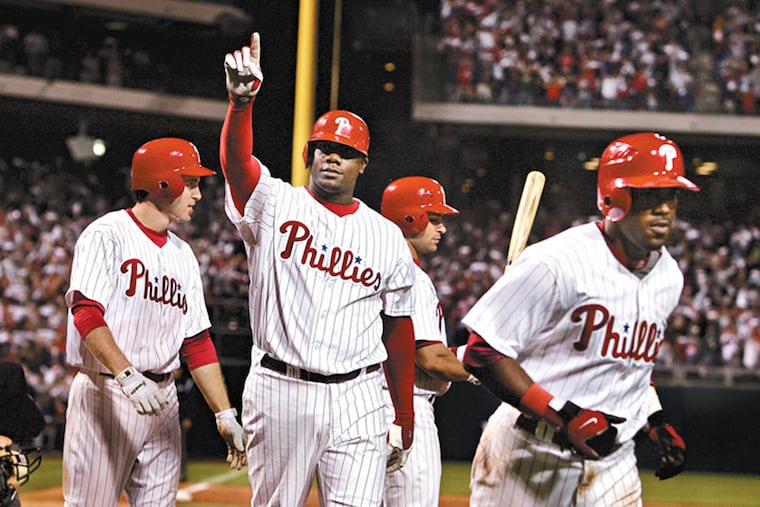Ryan Howard likes Bryce Harper’s MVP chances despite another playoff miss for Phillies
It wasn't held against Howard in 2006 that the Phillies didn't make the postseason when he won the MVP. He thinks Harper should be treated the same way.

ATLANTA — The Phillies did not make the postseason in 2006, but they likely would have been eliminated from contention far earlier than the final week had it not been for Ryan Howard.
He led the majors in homers, RBIs, and total bases while hitting .313 with an OPS that was 67-percent better than league average. It was a historic offensive season and the team’s shortcomings — the Phillies finished 85-77 and missed the wild card by three games — did not prevent Howard from being awarded the National League’s MVP Award that November.
In fact, Howard, who watched the Phillies this week at Truist Park, thinks Bryce Harper’s MVP case should be treated the same as the Phillies’ postseason drought hits a decade.
» READ MORE: Phillies’ offseason to-do list: Help Bryce Harper, upgrade infield and go deep on pitching
“It’s a team sport. Bryce can only do so much,” said Howard, who hit a franchise-record 58 homers in 2006. “It’s one of those things, what is the criteria for the MVP? OK, they may not make the playoffs, but if you took him out of the lineup, like how much further out are you out of the playoff race? Are we even having this conversation if he’s not doing what he’s doing? Are they 10 games out as opposed to having this series decide who wins the NL East? When it comes to the MVP, if you took this person out of the lineup, what would happen?”
Howard, who finished in the top 10 in MVP voting six straight years after winning it in 2006, thinks this year’s award is between Harper and Freddie Freeman. The Atlanta first baseman has the fourth-highest on-base percentage in baseball and put the Braves in position for a fourth straight division title.
But Harper’s toughest opposition for the MVP appears to be Washington’s Juan Soto, who is also playing for a non-playoff team. Soto leads the majors in on-base percentage, is second in the NL in batting average, and has the eighth-best second-half on-base percentage (.532) in baseball history.
Harper entered Thursday leading the National League in Win Probability Added — which tries to quantify the impact each plate appearance has on a team’s chance to win — and he has the second-highest Wins Above Replacement (6.4) in the NL, trailing only Soto, who has generated 6.6 WAR per FanGraphs.
» READ MORE: Phillies ‘in a better place,’ but Andrew McCutchen says ‘I could’ve been better’
Harper’s value is easy to measure, but how important is he really to the Phillies? He leads the majors in OPS (1.041) and is the only non-injured Phillies regular with an OPS better than .790. Harper, Howard said, is “one of those guys who can put a team on his back.” And that’s what he has done since the All-Star break.
But Harper needed more help to get the Phillies into the postseason. The Phillies lost Rhys Hoskins, who had the highest second-half slugging percentage in the majors, and Harper lost his support in the lineup.
The Phillies quickly learned what it was like to not have Hoskins, but Harper has started 69 straight games and has played every day since June 28. There’s no reference to what a lineup would look like without Harper, but it’s easy to imagine what the Phillies would look like without him.
“I think it’s Bryce being Bryce,” Howard said. “It’s what people look at him to do. For me, Bryce just has to go be Bryce and not be anything else. That’s it. If he goes and does what he normally does, he’s going to put up numbers. That’s what he’s doing now.”
Harper’s 1.192 OPS since the All-Star break is the third-highest in franchise history, trailing Howard’s 1.259 OPS in 2006 and Mike Schmidt’s 1.214 OPS in 1981. Harper carried the Phillies in the second half and helped them stay in playoff contention until the season’s final week.
The Phillies, just like they did in 2006, fell short. They missed a chance to have Harper’s season reach baseball’s biggest stage. He’ll find out in November if they wasted his chance to the MVP. For what it’s worth, it didn’t hurt Howard.
“I didn’t really put too much into it because I didn’t know what the criteria was,” Howard said when asked if he thought the postseason miss in 2006 would hurt his MVP chances. “I was just like ‘I’m going to go bang out on fools and see what happens.’ That was it. ‘I’m going to bang on people and whatever happens, happens.’”